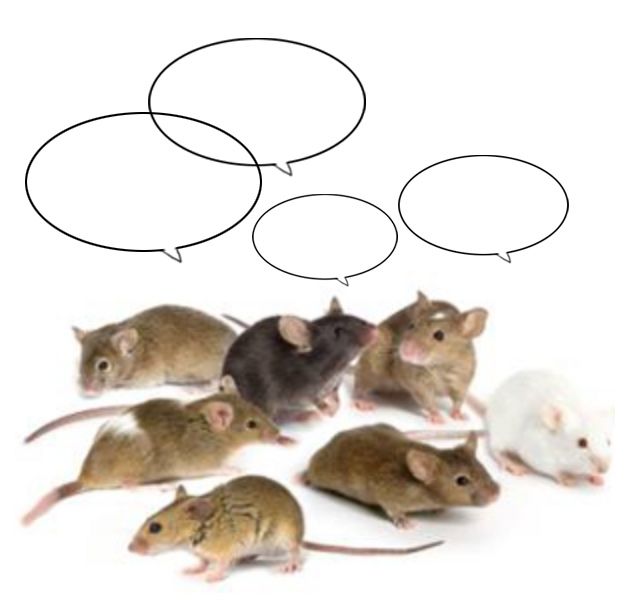
Dr. Dennis Drayna, Ph.D., has been studying genetics for more than thirty years, and specifically researching the genetics of stuttering for more than a decade. He is officially retired but still working, after spending the later part of his career at the National Institute on Deafness and Other Communication Disorders (NIDCD), part of the National Institutes of Health. Drayna’s latest research builds on his previous research that identified several genes associated with stuttering — information that could lead to a greater understanding of stuttering and possible treatments.
Not all cases of stuttering are proven to be genetically based, and there are many factors, internal and external, that contribute to the condition in ways that aren’t entirely understood. Stuttering clusters in families, but in unpredictable ways. So far, five genes have been identified as accounting for about 20-25% of all cases of stuttering. This is just a starting point, as Drayna believes more are yet to be discovered.
A Model for Experimental Study

Drayna's latest research employs a rather curious test subject - mice. One of the problems with exploring the genetic and neurological causes of stuttering is the lack of test subjects, as animals do not speak. Yet some animals, like mice, use vocalizations to communicate with each other, although it is not audible to humans. Drayna’s research team employed powerful microphones to detect their squeaky-sounding vocalizations. When certain mice were implanted with the genes associated with stuttering, disruptions in their vocalizations were identified compared to non-affected mice. The mice are not literally stuttering as we understand it. They are experience a disruption to the vocal mechanism that can be analyzed in place of stuttering, allowing them to serve as test subjects.
When discussing his findings, Drayna has often remarked that one noteable characteristic of stuttering in humans is that no other behaviour is affected: whatever the cause of stuttering is, the effect is specific to the speech function. Neurologically, the mice with the altered DNA displayed similar structural and functional anamolies in the same region of the brain as human stutterers that affects their speech/squeaking vocalization. In order to make sure that the genetic mutation was affecting mice the same way as humans, the mice were thoroughly examined for change in their biology, functioning and intelligence to prove that nothing else was affected.
Stuttering at the Cellular Level
Drayna’s research also has determined which neural cells, and which cellular functions, are affected by the stuttering genes. The gene mutation interferes with the process known as Lysosomal storage (intracellular trafficking). Simply put, the lysosomal process recycles waste material from a cell, specifically the “astrocyte” cells. These cells are not the more electrically charged neurons in the brain and act more as secondary players in brain activity.
What are the implications of these discoveries? There are other conditions, like Alzheimer’s, are also” lysosomal storage” disorders. While it is revealed through autopsy that Altzheimer’s patients have plaque on the brain, it has not been known until recently how this plaque came to be, and the conditions at earlier stages in the disease, before onset. Pharmaceutical treatments for the lysosomal storage deficiency are currently being developed.
The Experience of Stuttering
In his conversation with Stuttertalk host Peter Reitzes, other less scientific aspects of the research are discussed, such as social factors. Not much difference was found in the way the “disfluent” squeaking mice were treated socially, except that they tended to vocalize somewhat less than the others, and were at a slight disadvantage when it came to attracting a mate. When a female mouse had a choice between two mice, one of whom was affected by the stuttering gene and one who was not, she was slightly more likely to choose the “fluent” mouse. The genetically affected mice still found mates and have offspring, even though a deficiency in their “courtship songs” made it harder. (“Thanks, Einstein!” say male stutterers everywhere.)Possibilities of Genetic Treatments
Drayna revealed more findings during his talk with Reitzes. It’s long been known that girls who stutter are more likely to outgrow stuttering than boys. Female brains are more “plastic” than male brains, and better at correcting problems, including stuttering. It is still difficult to determine which children are more likely to outgrow stuttering. But the presence of the gene is not a clear cut case – girls are also more likely to have the genetic trait and not stutter.The study examined people who stuttered who had the gene vs those who did not in relation to therapy outcomes, and there is a difference between them — treatment has better results for those who do not have the mutation by a small margin. Can we determine which children are more likely to recover by examining their genes? Can we provide more suitable individualized treatment for adults based on their genetic traits? Right now it is still hard to determine, and more knowledge could help direct resources to the children most at risk for persistent stuttering, and provide more efficient treatment in general.
What about gene therapy? Currently it is used in a limited fashion, and is still in development. It is believed that immune deficiencies and eye retina diseases can be treated with gene therapy.
Drayna's research is ongoing, and promises much for the understanding of stuttering and possible new approaches to treatment.
BIBLIOGRAPHY
Genetic approaches to understanding the causes of stuttering; Dennis Drayna 1, Changsoo Kang
NIH study in mice identifies type of brain cell involved in stuttering
Stuttertalk episode: The Genetics of Stuttering with Dr. Dennis Drayna from the NIH (Ep. 684)